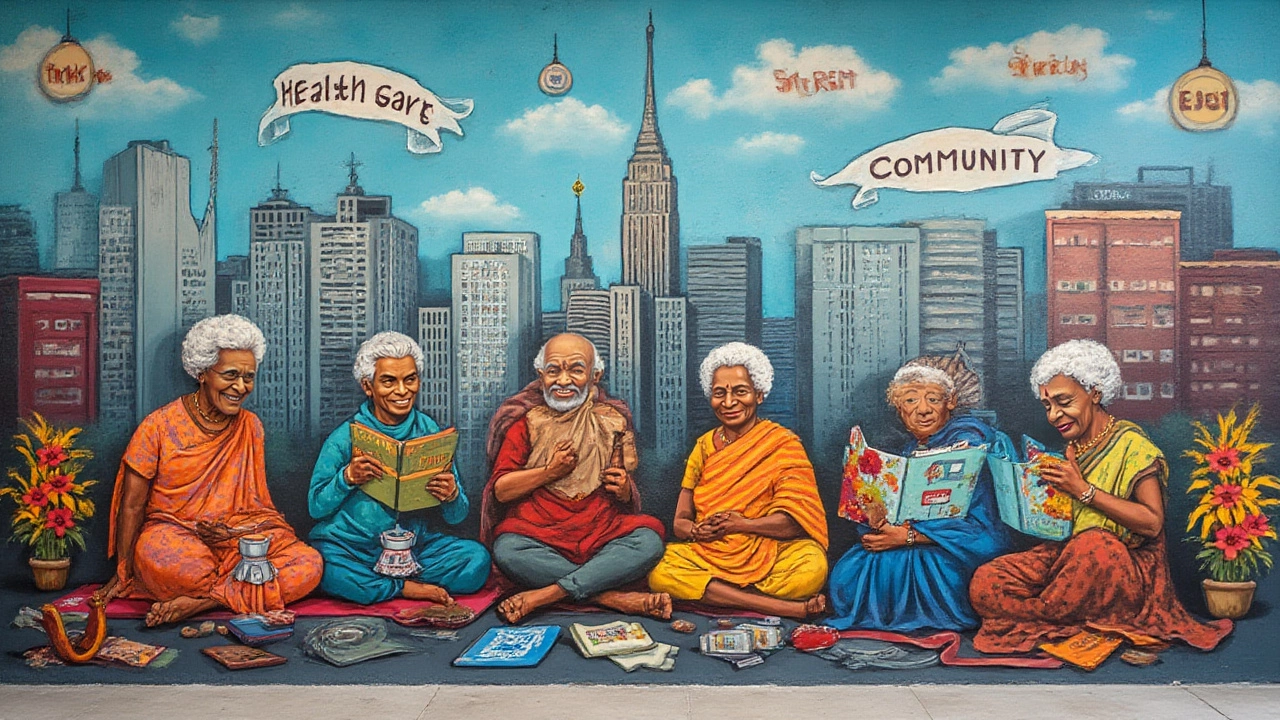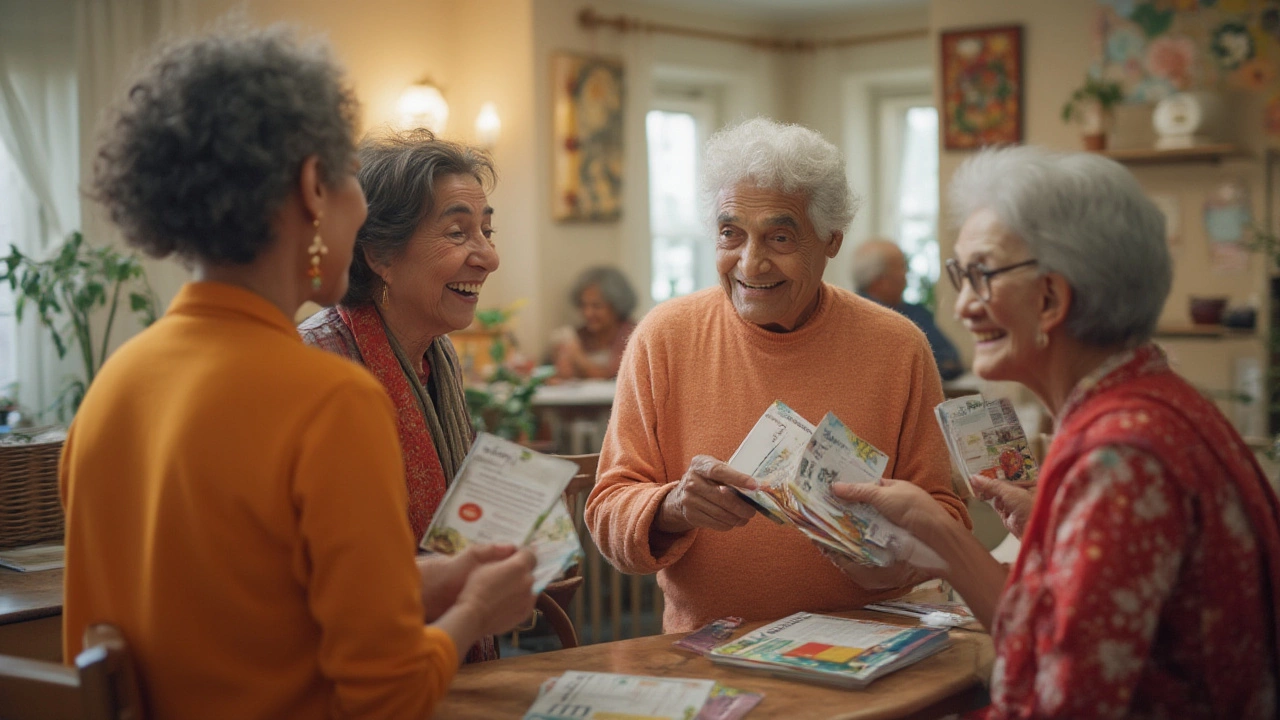Picture this: Someone’s grandma is stuck between rising living costs and the fear of being a burden. Yet, she’s living in a state where tons of help is actually waiting for her—she just needs to know where to look. Massachusetts quietly shines as one of the best states for supporting its older residents. Here, help isn’t tucked away in some dusty folder. It has a real, daily impact. So, what’s available if you or a loved one calls the Bay State home and could use a boost?
Types of Elderly Assistance Available in Massachusetts
Let’s clear up one thing right away—elder assistance isn’t just about old-fashioned nursing homes. The options run the gamut, from free rides across town to help with groceries, from legal advice to high-quality healthcare navigation. Programs here target everyone’s different needs—whether someone’s fiercely independent or craving a bit more social connection.
Area Agencies on Aging (AAAs) are the entry point for most programs. There are 25 of these regional nonprofits, and they’re funded by both federal and state money. Their job? Connect seniors, usually aged 60+, with what they actually need. Think Meals on Wheels, shuttle buses for doctor’s appointments, free legal clinics, help filling out forms, care management, friendly visiting, and much more.
The Executive Office of Elder Affairs (EOEA) orchestrates programs from the top. They make sure councils on aging, supportive housing, caregiver resources, and elder protective services are all running smoothly. Massachusetts has more Councils on Aging—one in almost every city and town—than any other state. These centers are social hubs, but also a place to get discounts, referrals, and workshops on money, health, and independent living.
There’s no shortage of medical options, either. The state supports things like PACE (Program of All-Inclusive Care for the Elderly), which is pretty much a one-stop shop for everything a senior needs once day-to-day living gets tricky. For eligible folks, programs can cover nursing, adult day health, prescriptions, home modifications, and even fun stuff like hobby classes.
Financial and Housing Support for Seniors
Affording life in Massachusetts isn’t always easy, especially on a fixed income. But the state’s approach is simple: No one should have to choose between food and rent or medicine and heat. That’s where a bunch of financial support programs come in.
Here’s a big one: Supplemental Nutrition Assistance Program (SNAP). In Massachusetts, seniors can qualify with fewer hoops to jump through and, as of 2025, participation is at a record high for anyone over 60. The Mass Senior Circuit Breaker Tax Credit lets eligible seniors get substantial relief on their state income tax if their property taxes (or rent) eat up too much of their budget. And don’t forget LIHEAP, which covers fuel and utility bills for income-eligible people—seniors are prioritized during the coldest months.
Affordable housing programs are also surprisingly robust. The Massachusetts Department of Housing and Community Development funds a range of subsidized options specifically for people 60 and older. These aren’t just cookie-cutter apartment blocks—the options include modified homes or apartments where everything, from grab bars to elevators, is tailored for safety and independence. Waitlists exist, but seniors who can show a serious health or safety need can sometimes skip ahead.
Reverse mortgages, grants for home modifications, and citywide property tax assistance programs—often based on need and age—can be tapped, too. The state even set up a hotline for emergency housing help if a sudden event leaves an older person without a place. And for those who can still manage on their own with a bit of help, the Frail Elder Waiver program offers a path to stay at home instead of a nursing home, with services like home-delivered meals, cleaning, and visiting nurses covered under Medicaid.
| Program | What It Covers | Who Qualifies | Notes |
|---|---|---|---|
| SNAP (Food Stamps) | Monthly food budget | Income-eligible, 60+ | Easier process for seniors |
| Senior Circuit Breaker Tax Credit | Property tax/rent credits | 65+, income and property limits | Up to $1,200/year (as of 2025) |
| LIHEAP | Energy and heating bills | Income-eligible | Priority for seniors in winter |
| Frail Elder Waiver | Home care services | Medicaid-eligible, need help with daily living | Keeps seniors out of nursing homes |

Healthcare and Prescription Assistance Programs
Life gets complicated fast when you’re juggling co-pays, prescription refills, and doctor visits. Massachusetts tries to take some of the stress off with healthcare programs built for the realities of senior living. The flagship program is MassHealth, the state’s version of Medicaid, which covers hospital stays, check-ups, lab work, specialist visits, and sometimes dental and vision care for low-income residents 65 and older.
Medicare Savings Programs take the edge off for people on Medicare who might still struggle with premiums or out-of-pocket costs. Qualified seniors can get help paying their Part B premiums, deductibles, and prescription drugs. The SHINE (Serving the Health Insurance Needs of Everyone) program is also worth shouting about. Certified counselors (many of whom are retired nurses or social workers) walk seniors through all their options—public and private—so they’re not stuck deciphering insurance jargon alone. These advisors have helped thousands find the cheapest plans or unearth long-lost benefits.
Prescription drug prices hit hardest for people on a fixed income. The Prescription Advantage program is a state-run option that covers some gaps in Medicare Part D coverage. It’s open to all Massachusetts residents aged 65 and over, regardless of income, but the amount of help increases on a sliding scale. For those who need insulin, blood pressure meds, or maintenance drugs, Prescription Advantage can be a financial lifesaver.
Special clinics and memory care resources offer health screenings for hearing, vision, diabetes, or dementia without giant hospital bills. Many hospitals and universities in the state pair up with advocacy groups to provide low-cost or even free flu shots, mammograms, and check-ups. Plenty of pharmacies also run "brown bag" medication review events—seniors bring in every pill, bottle, and supplement so a pharmacist can check for interactions for free.
If navigating the world of healthcare seems overwhelming, AAA’s case managers often handle everything with patients: from calling doctors after a bad fall, to explaining urgent care options, or arranging home health aides who are actually certified and background checked.
Social Engagement, Transportation, and Community Resources
It’s easy to forget that loneliness, not just physical health, plays a huge role in whether someone thrives past retirement age. Massachusetts—almost quietly—is really good at keeping seniors active and socially plugged-in. Almost every community has a Council on Aging, offering daily lunches, workshops, movie nights, Tai Chi classes, and support groups for things like grief, vision loss, or caregiving.
Statewide, the Massachusetts Senior Games get hundreds of older adults running, swimming, or cycling every year—making headlines and smashing stereotypes about aging. Transportation programs, like The Ride (in the Boston area), pick up people at their door and bring them to medical appointments, grocery stores, or even the beach, for a very low fare. Rural areas, too, have shuttle-style programs, and many offer vouchers for senior cabs or Uber rides through partnerships.
Volunteering is a lifeline for many. Some organizations match retired teachers with struggling readers, or connect music-loving elders with local youth orchestras. Programs like RSVP (Retired Senior Volunteer Program) and Foster Grandparents give meaning—and sometimes a modest stipend—to seniors who want to give back. Beyond that, "friendly visitor" services pair volunteers with isolated seniors for regular chats, walks, or hobby meet-ups.
Libraries, museums, and YMCAs almost always have senior hours, discount tickets, or dedicated classes. Mass Cultural Council even offers free "Culture Cards"—passes that let older adults and their caregivers explore local events or museum exhibitions for free or at huge discounts.
Here’s a tip: Signing up with your local AAA or Council on Aging often unlocks newsletters full of seasonal events, fraud alerts, or special deals in your own neighborhood you might otherwise miss.

How to Access and Apply for Senior Assistance Programs in Massachusetts
It’s never been simpler to tap into these resources—even if paperwork makes you itchy. First, find your local Area Agency on Aging (easy online or through the EOEA’s finder tool). Call or walk into your neighborhood Council on Aging for personalized help—they often hold "Ask the Expert" drop-ins where you can meet lawyers, nurses, and benefits counselors face to face.
- Elderly assistance Massachusetts programs typically only require some documentation (photo ID, proof of income, medical forms).
- Some programs, like the Senior Circuit Breaker Tax Credit or state rent assistance, use simple tax forms or a single-page application.
- For housing or home care, expect some waiting time and a health assessment, but you get individual help along the way.
- Most AAA or Council on Aging staff will offer to check your eligibility for multiple benefits at once, so you won’t miss out on overlapping programs.
- Don’t worry about technology fears—there are phone lines, paper applications, and actual people ready to walk anyone through the steps.
- You can designate a caregiver or family member as an "authorized representative" to handle forms, calls, and red tape.
A little-known trick: Many towns offer "senior ombudsmen"—advocates who act as your troubleshooters, mediators, or even just expert listeners if you hit a roadblock or don’t know which program comes first.
Wondering about timing? SNAP decisions often come within 30 days; MassHealth’s application process has sped up post-pandemic, with most cases resolved in six to eight weeks. If you need emergency help, such as housing after a fire, both local agencies and the state have quick-turnaround assistance, especially for seniors with health risks.
Bookmarking MassOptions.org is a smart move. It’s a one-stop gateway for finding every type of elder service, checking eligibility, and getting updates on waitlists in real-time. Councils on Aging often keep printouts or even "cheat sheets" for popular programs at their front desks. If you only take away one thing: Ask for help—there’s no shame and lots of reward waiting on the other side.
